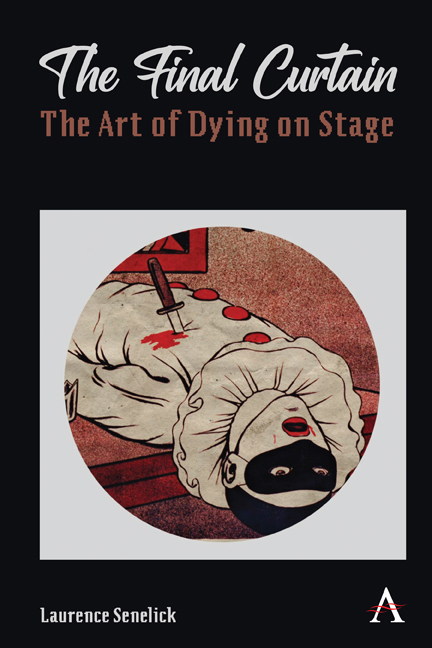3 - Death-Defying Exploits
Published online by Cambridge University Press: 15 September 2022
Summary
Dullness is a crime in the theatre.
A. P. D. PenroseThe Road Not Taken
Contrary to popular belief, performances went on in the British provinces and private homes during the Interregnum even after the official ban on theater. Nevertheless, many traditions were interrupted or fell in desuetude. When the court returned from its exile abroad, its theatrical tastes had been shaped by the French. Daggers continued to be drawn, hair-raising descriptions continued to be declaimed, but on-stage death fell out of fashion even after Shakespeare and his contemporaries began to be revived.
The French constraints were in place early. Jean de la Taille, a humanist playwright, in his De l’art de la tragédie (1572), proclaimed that tragedy “treats only piteous ruins of great lords, inconstancies of Fortune, banishments, wars, plagues, famines, captivities, execrable cruelties of tyrants and, in short, nothing but tears and extreme miseries.” Nevertheless, following the Horatian precept, the spectators must not be confronted with ultraviolence. In addition to preserving the unities of time and place, “one must be careful not to do anything on stage that cannot be done commodiously and decently (honnestement), so as not to carry out murders and other deaths, and not in pretense or otherwise, for each one will always see what it is, and that it is not always feigning (faintise).” These recommendations harden into the laws of French neoclassic drama over the next few years.
Indeed, had it not been for Cardinal Richelieu's eagerness to centralize his nation's cultural heritage, French drama might easily have gone the way of the Elizabethans. De la Taille's strictures were meant to rebuke the already burgeoning bloodshed of Renaissance tragedy that reflected the ever-present turbulence of civil and religious wars. Stage violence was but a pale reflection of the atrocities visited by French Catholics on Protestants and vice versa. A generation later, in his Art poëtique françois (1597), Pierre Laudin d’Aigaliers contradicted de la Taille, insisting that theater must cater to the taste of the audience, which prefers convulsive emotions, spectacular horrors, and terrifying deeds. If tragedy is indeed a representation of the lives of rulers and heroes, cruelty must be a constituent part of it.
- Type
- Chapter
- Information
- The Final CurtainThe Art of Dying on Stage, pp. 65 - 96Publisher: Anthem PressPrint publication year: 2022



